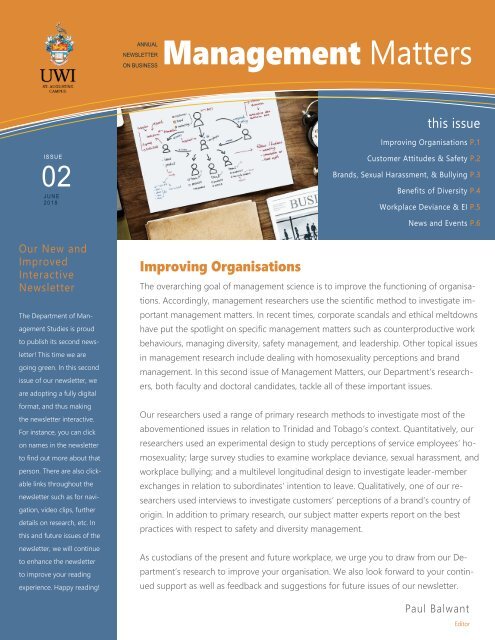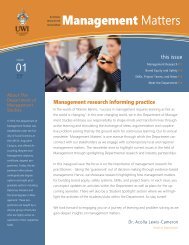Management Matters Issue 2
The Department of Management Studies' annual newsletter
The Department of Management Studies' annual newsletter
Create successful ePaper yourself
Turn your PDF publications into a flip-book with our unique Google optimized e-Paper software.
The Department of <strong>Management</strong><br />
Studies is proud<br />
to publish its second newsletter!<br />
This time we are<br />
going green. In this second<br />
issue of our newsletter, we<br />
are adopting a fully digital<br />
format, and thus making<br />
the newsletter interactive.<br />
For instance, you can click<br />
on names in the newsletter<br />
to find out more about that<br />
person. There are also clickable<br />
links throughout the<br />
newsletter such as for navigation,<br />
video clips, further<br />
details on research, etc. In<br />
this and future issues of the<br />
newsletter, we will continue<br />
to enhance the newsletter<br />
to improve your reading<br />
experience. Happy reading!<br />
The overarching goal of management science is to improve the functioning of organisations.<br />
Accordingly, management researchers use the scientific method to investigate important<br />
management matters. In recent times, corporate scandals and ethical meltdowns<br />
have put the spotlight on specific management matters such as counterproductive work<br />
behaviours, managing diversity, safety management, and leadership. Other topical issues<br />
in management research include dealing with homosexuality perceptions and brand<br />
management. In this second issue of <strong>Management</strong> <strong>Matters</strong>, our Department’s researchers,<br />
both faculty and doctoral candidates, tackle all of these important issues.<br />
Our researchers used a range of primary research methods to investigate most of the<br />
abovementioned issues in relation to Trinidad and Tobago’s context. Quantitatively, our<br />
researchers used an experimental design to study perceptions of service employees’ homosexuality;<br />
large survey studies to examine workplace deviance, sexual harassment, and<br />
workplace bullying; and a multilevel longitudinal design to investigate leader-member<br />
exchanges in relation to subordinates’ intention to leave. Qualitatively, one of our researchers<br />
used interviews to investigate customers’ perceptions of a brand’s country of<br />
origin. In addition to primary research, our subject matter experts report on the best<br />
practices with respect to safety and diversity management.<br />
As custodians of the present and future workplace, we urge you to draw from our Department’s<br />
research to improve your organisation. We also look forward to your continued<br />
support as well as feedback and suggestions for future issues of our newsletter.
The landmark ruling on the<br />
decriminalisation of buggery<br />
laws in Trinidad and Tobago<br />
has brought the issue of homosexuality<br />
to the forefront<br />
of the national psyche. Research<br />
conducted by Cherisse<br />
Permell-Hutton and Barney<br />
Pacheco is therefore timely in<br />
its investigation of how heterosexual<br />
consumer attitudes<br />
are affected by their perception<br />
of the sexual orientation<br />
of employees in a service<br />
setting.<br />
An experimental design was<br />
used to manipulate the nonverbal<br />
gender cues exhibited<br />
by service employees in a<br />
high- and low-contact service<br />
setting. As predicted, heterosexual<br />
customers who perceived<br />
the service employee<br />
to be homosexual vs. heterosexual<br />
had a significantly<br />
more negative attitude towards<br />
the employee and<br />
company. Attitudes towards<br />
the company were also more<br />
negative for a high-contact vs.<br />
low-contact service but, surprisingly,<br />
there was no significant<br />
difference in attitudes<br />
towards the employee across<br />
service types.<br />
Overall, the results suggest<br />
that in Trinidad and Tobago,<br />
where homosexuality is stigmatised,<br />
managers need to<br />
take into account employees’<br />
nonverbal behaviours, which<br />
may result in the perception<br />
of homosexual orientation<br />
and negatively affect consumer<br />
attitudes. The findings also<br />
pose serious implications for<br />
relocation policy development<br />
and employee training by<br />
multinationals operating locally,<br />
in light of possible discrimination<br />
and even overt<br />
hostility by customers towards<br />
employees they perceive as<br />
homosexual.<br />
How can you improve safety in your manufacturing<br />
company? Where should you focus?<br />
Occupational Safety and Health (OSH)<br />
can feel pretty complex, and perhaps even<br />
overwhelming. In our research into safety<br />
systems, my co-author, Kit Fai<br />
Pun, and I identified 3 factors to<br />
focus on as follows:<br />
(1) OSH Oversight elements,<br />
which communicate the company<br />
safety policy, fulfil OSHA documentation<br />
requirements, and<br />
ensure the safety system is supported<br />
by a dedicated safety leader and<br />
good collaboration on an OSH Committee.<br />
(2) OSH Arrangements, which focus on proactivity<br />
through effective risk assessments,<br />
emergency plans, procedures for work in<br />
confined spaces and control of hazardous<br />
materials, as well as safeguarding of moving<br />
parts.<br />
(3) Improvement Drivers, which keep advancing<br />
the safety system through<br />
“...ensure the safety top managers who are knowledgeable<br />
and committed to safety, em-<br />
system is supported<br />
ployees who build safety into how<br />
by a dedicated safety<br />
they do their jobs, accident reporting<br />
and investigation, and finally<br />
leader and good<br />
collaboration on an training, information, instruction,<br />
OSH Committee” and supervision.<br />
Planning and implementing improvements<br />
to the above areas can considerably improve<br />
safety and reduce losses caused by<br />
accidents and incidents. To learn more,<br />
watch the video below and click here to<br />
read the publication.
The vastly changing landscape in<br />
Trinidad and Tobago is compelling<br />
gate how the strength of brands<br />
and their country of origin can<br />
practice. First, the study confirms<br />
the influence of branding on con-<br />
brand owners to develop influence consumer behaviour. sumers’ preferential behaviour<br />
creative and persuasive strategies<br />
to defend their competitive turf.<br />
Many local companies are investing<br />
in building stronger brand<br />
images through advertising, promotion,<br />
innovation and many<br />
other initiatives that create trust<br />
and distinctive appeals. But, the<br />
success of these strategies depends<br />
The results from 157 customer<br />
interviews supported the role of<br />
strong brands on favorable consumer<br />
behaviour. However, the<br />
findings suggest that favourable<br />
consumer behaviour depends on<br />
the brand’s country of origin.<br />
Consumers appeared less inclined<br />
to focus on marketing cues when<br />
and strongly supports initiatives<br />
to strengthen the image and appeal<br />
of local brands. Second, the<br />
study highlights the ‘halo-effect’<br />
of a brand’s country of origin on<br />
favorable consumer behaviour.<br />
Third, the effects of a country’s<br />
poor reputation may be reduced<br />
if the marketer embarks on adver-<br />
on the incremental value brands are manufactured in tising and promotional campaigns<br />
customers gain from the purchase<br />
of local brands. Meena Rambocas<br />
countries with favorable reputations.<br />
This study has three main<br />
designed to promote the quality<br />
and perceived value of the brand.<br />
and Aniera Ramsubhag investi-<br />
implications for management<br />
Sexual harassment has become a topical and<br />
pervasive issue that has been receiving considerable<br />
media attention globally, inclusive of Trinidad<br />
and Tobago. Sexual harassment<br />
usually takes the form<br />
of unsolicited physical contact<br />
and unwelcomed verbal and<br />
non-verbal advances. In Trinidad,<br />
sexual innuendos are<br />
deeply embedded in the national<br />
culture. Specifically, music and literature in<br />
Trinidad is filled with sexual imagery and metaphors,<br />
which may make it difficult for employees<br />
to discern sexual boundaries in interactions. Paul<br />
Balwant, Odell Jueanville, and Shalini Ramdeo<br />
investigate mental health as a mechanism in the<br />
relationship between sexual<br />
harassment and organisational<br />
commitment. The findings suggest<br />
that mental health is a<br />
mechanism for men, but not<br />
women. Perhaps women may<br />
generalise the source of sexual<br />
harassment from their supervisor or coworker to<br />
the organisation as a whole, and thus direct blame<br />
to the organisation. See the video for implications.<br />
Shalini Ramdeo<br />
Extant research indicates that<br />
reactions to workplace bullying<br />
have ramifications for<br />
individuals, organisations, and<br />
society. To date, researchers<br />
have focused almost exclusively<br />
on the prevalence, antecedents,<br />
and consequences of<br />
bullying. However, few attempts<br />
have been made to<br />
understand the reasons for<br />
the underlying effects on employees’<br />
work-related outcomes<br />
when they are exposed<br />
to bullying. Shalini’s contribution<br />
to knowledge lies in explaining<br />
‘why’ exposed employees<br />
and bystanders react<br />
to workplace bullying and<br />
‘how’ this reaction comes<br />
about. Using a sample of 500<br />
employees from organisations<br />
in Trinidad and Tobago, the<br />
findings supported the mediating<br />
effects of (1) procedural<br />
justice on organisational commitment<br />
and turnover intent,<br />
and (2) interactional justice on<br />
organisational commitment<br />
and organisational citizenship<br />
behaviour (to individuals).<br />
These findings were consistent<br />
for the bystander and<br />
procedural justice, but procedural<br />
justice also mediated<br />
the relationship between bullying<br />
and organisational citizenship<br />
behaviour (to organisation).<br />
The findings further<br />
supported the moderatedmediation<br />
effects of perceived<br />
organisational support on<br />
turnover intent and organisational<br />
citizenship behaviour<br />
(to individuals) for exposed<br />
workers.
The Department<br />
of <strong>Management</strong><br />
Studies is<br />
excited to announce the<br />
launch of our sleek new website.<br />
We have made numerous<br />
changes to the website to<br />
include dropdown menus and<br />
a more streamlined navigation.<br />
There are a myriad of<br />
smaller changes throughout<br />
the website, all with the intention<br />
of making your browsing<br />
experience better. As we continue<br />
to improve our website<br />
design, we welcome your<br />
feedback on these changes.<br />
We also invite you to bookmark<br />
our website so that you<br />
can quickly peruse the latest<br />
news and events at the Department.<br />
You can click the<br />
above icon to access the website<br />
or visit http://sta.uwi.edu/<br />
fss/dms/<br />
Trinidad and Tobago is one of the most<br />
diverse island states in the Caribbean region.<br />
As microcosms of society, this diversity<br />
is reflected within organisations island<br />
wide. As such persons of diverse ages, races,<br />
sexes, sexual orientations and religious<br />
addition, the acceptance of diverse people<br />
will be influenced by the extent to which<br />
the organisation actively recognises the<br />
contribution of all individuals on their merit,<br />
rather than relying on stereotypes (to determine<br />
their worth and value).<br />
beliefs are employed across different sectors.<br />
Academic scholars are engaged in an<br />
ongoing debate as to whether or not organisations<br />
Disparate treatment on the basis of sex,<br />
race, ethnicity, origin, religion, marital status<br />
benefit from diversity, and have<br />
and disability, has been outlawed in Trinidad<br />
and Tobago, through the enactment of<br />
suggested that the following gains may be<br />
the Equal Opportunity Act, 2000.<br />
realised by diverse organisations:<br />
increased innovation and<br />
“...benefits are not However, a 2007 survey conducted<br />
creativity; a wider and more diverse<br />
necessarily realised by the UK based Chartered Institute<br />
talent pool; increased simply by virtue of<br />
of Personnel and Development<br />
(CIPD) found that legislation is only<br />
productivity; and increased market<br />
share as a result of the di-<br />
having a diverse<br />
one factor which may influence an<br />
workforce ” organisation’s decision to embrace<br />
verse staff members attracting a<br />
wider range of clients and/or customers.<br />
diversity. They found that factors<br />
such as a desire to recruit and retain talented<br />
However, these benefits are not necessarily<br />
realised simply by virtue of having a diverse<br />
workforce. In fact, there are certain context<br />
specific factors that may impede the accrual<br />
employees; the pursuit of a CSR agenda;<br />
a moral obligation; and an improvement in<br />
business performance and other tangible<br />
benefits were also persuasive.<br />
of the desired benefits. These factors include<br />
the existing organisational culture<br />
and the extent to which it is inclusive; the<br />
extent to which diverse groups depend on<br />
and interact with each other in order to<br />
successfully complete a task/project; and<br />
the extent to which inclusivity is championed<br />
by the organisation’s leadership. In<br />
For organisations employing a homogeneous<br />
staff, a transition towards heterogeneity<br />
is not a panacea. Any movement towards<br />
greater inclusivity will require a clear<br />
change management strategy and will be<br />
best achieved by taking incremental steps<br />
towards this goal.
Ansylla Payne-Quan<br />
Kep<br />
Workplace deviance is one of the<br />
most costly, destructive issues<br />
facing organisations today. Workplace<br />
deviance refers to purposeful,<br />
norm-violating employee<br />
behaviours that may harm businesses<br />
and/or its members. Research<br />
has largely focused on the<br />
negative outcomes of deviant<br />
work behaviours. However, employee<br />
perceptions and attitudes<br />
can predict the extent to which<br />
employees engage in deviance.<br />
Riann Singh conducted a study<br />
with a Trinidad sample of 969<br />
employees which explored the<br />
relationship between employee<br />
perceptions of organisational<br />
support, organisational trust, their<br />
embeddedness within their organisation<br />
and the extent to<br />
which such perceptions and attitudes<br />
impact deviance. The findings<br />
suggest that employees’<br />
perception of organisational support<br />
and organisational trust each<br />
negatively predicts deviant behaviours.<br />
However, when support<br />
and trust are high, if employees<br />
are not highly embedded in their<br />
jobs, deviance can increase.<br />
This study has two important<br />
practical implications. First, the<br />
findings suggest that organisations<br />
should strive to treat employees<br />
in a consistent and positive<br />
manner during all employee<br />
interactions to help build support<br />
systems and maintain trust. Second,<br />
organisations should be<br />
wary of attempts to retain employees<br />
who perceive little organisational<br />
support or little organisational<br />
trust since such retention<br />
strategies can negatively impact<br />
employees who are deeply embedded<br />
by possibly initiating an<br />
increase in deviant behaviours.<br />
Service level employees in the<br />
fast food industry are known<br />
to be very transitory, negatively<br />
impacting operational<br />
efficiency and customer service<br />
delivery for many businesses<br />
therein. Ansylla conducted<br />
a quantitative, longitudinal,<br />
multi-level study that<br />
focused on West Indian based<br />
fast food companies. In this<br />
study, Ansylla investigated<br />
Leader-Member Exchange as<br />
a predictor of subordinates’<br />
intention to leave an organisation.<br />
In that relationship, she<br />
further examined emotional<br />
intelligence and perception of<br />
supervisory support as a moderator<br />
and mediator respectively,<br />
and thus adds to management<br />
research in this regard.<br />
Ansylla collected three<br />
waves of data, with the sample<br />
being drawn from fast<br />
food employees based in<br />
Trinidad, St. Lucia, and St.<br />
Kitts. The findings supported<br />
the proposed relationships<br />
with the exception of the<br />
moderating effect of emotional<br />
intelligence.<br />
Then, drop by for our annual research week! This<br />
year, our three-day Research Week was fully<br />
sponsored by our partner TSTT, which is a testament<br />
to one of the main goals of the<br />
Department which is industry engagement.<br />
On the first day, Masters students<br />
presented a snapshot of their research<br />
which ranged from addressing HR issues<br />
in the workplace to efficiently managing sport<br />
facilities across the island. On the second day,<br />
the general public was treated to four panel sessions<br />
with a mix of industry experts including<br />
Robert Mayers and David Abdullah, and subject<br />
matter experts from the Department including<br />
Vaalmikki Arjoon and Acolla Lewis-Cameron.<br />
Some of the issues addressed include marketing<br />
strategies for an economy in decline, devaluation<br />
for financial success, governance of<br />
state enterprises and managing human resources.<br />
Research Week closed with a Business<br />
Challenge for the undergraduate Industrial<br />
Relations students for which they confronted<br />
the current industrial relations challenges facing<br />
Trinidad and Tobago before a panel of esteemed<br />
industry experts including the president of the<br />
Energy Chamber of Commerce.
Professor Rajendra Ramlogan launched his book of poetry titled, “My Words, My Liberation”.<br />
The Department has launched “The University of the West Indies/Republic Bank <strong>Management</strong> Challenge” to generate<br />
novel solutions to workplace issues via students’ research.<br />
We congratulate (1) Ryan Manbodh for being the Most Outstanding <strong>Management</strong> Studies Student in 2017 and (2)<br />
Terryann Floyd for receiving the AFUWI Scholarship for the 2017/2018 academic year.<br />
The UWI STA Tourism Society was officially launched in January 2018 with the goal of educating, engaging, and<br />
empowering students and the public about the wonders of the Tourism industry.<br />
<strong>Management</strong> Studies Newsletter <strong>Issue</strong> 02 June, 2018 | Editor: Paul Balwant




